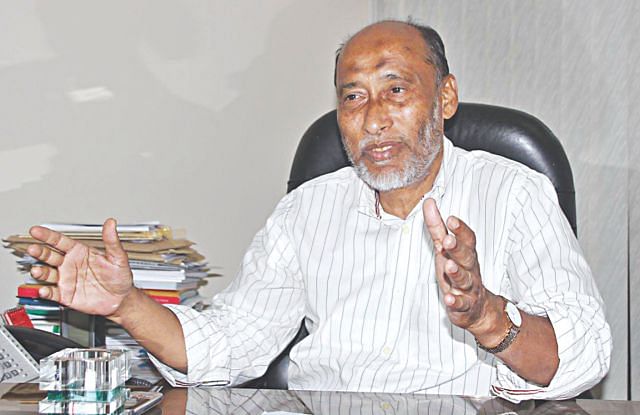Land acquisition hinders industrialisation
The process of acquiring land to set up new industries should be eased, said the chief a large conglomerate in Bangladesh.
A 10-year industrial development plan, with designated areas for heavy, medium and light industries, is required if the country is to become an emerging country, Mohammed Abul Kalam, managing director of TK Group of Industries, told The Daily Star.
He said such a plan would ensure that new industries can be set up with proper infrastructure and provision for power and gas, which will go a long way in industrialisation.
Sharing his experience, the managing director said, “It took me more than three years to acquire a 6-acre plot to set up a caustic soda plant, and the full process has not been completed yet.”
Recalling his early days, Kalam said his father Mir Ahmed Sowdagar had his own shop in Chaktai in Chittagong, but business was not doing well. He gave Kalam the sale proceeds of 1,000 kilograms of paddy to start his own business in 1972. With a meagre amount of Tk 1,800, Kalam began trading in food grains. He later ventured into edible oil and spices.
Business expanded rapidly and he set up his first venture -- TK Oil Refinery Ltd -- in 1986 with a workforce of around 150. Hard work, tenacity and, above all, commitment were instrumental in making his business successful.
Today, TK Group has 27 industrial units in various fields, including edible oil, steel, board, paper, textiles, packaging and containers, tea, ship building, cement and consumer products. The group is also engaged in general trading.
His group now employs about 9,000 people and turnover last year was nearly $1 billion.
“Our annual contribution to the government exchequer in the form of duties, VAT and taxes exceeds Tk 600 crore.”
After meeting local demand, the group also exports hydrogen peroxide, chlorine, caustic soda and chlorinated paraffin wax to countries like South Korea, Turkey, the Philippines, Malaysia, India, Sri Lanka and Syria.
The managing director said the main reason for their success has been risk taking combined with hard work and commitment.
On plans for expansion, Kalam said, “We are now in the process of setting up a petro-chemical plant, which through naptha cracking, will be producing products like octane, xylene, LP gas and solvents to be used as raw materials for paints and chemical industries.”
Recognising their corporate social responsibilities, the group runs a health centre in Patiya, which has been providing free medical treatment and medicine to over 10,000 impoverished people in the area since mid-1990s.
“We also help and support innumerable educational institutions by providing funds,” Kalam added.
In addition, the group contributes to government and private relief efforts in times of natural calamities.
Kalam said for young people to come into business, they have to follow a vision of “creating value while making a difference”.
After a humble beginning in business, he is a believer in “nurturing the 5Ps -- people, portfolio, partners, profit and productivity”.
“There have been many hurdles in my business life and I have always taken them as challenges.”
He, however, said banks that finance a group of industries should not look at only the performance of one or two units in a group, which may not be at a profitable stage. Rather, the overall performance of the group, should be evaluated in order to help in their expansion programmes.
“As a result, the loss-making concerns could be helped to turn their fortunes,” he added.
On its latest venture, Enterprise Resource Planning (ERP), the TK Group top official said it is a high-tech modern business tool where instant information and analysis data is available that helps take better business decisions.
ERP is now in its implementation stage and it is expected to be fully operational in 2014, Kalam added.


 For all latest news, follow The Daily Star's Google News channel.
For all latest news, follow The Daily Star's Google News channel. 



Comments